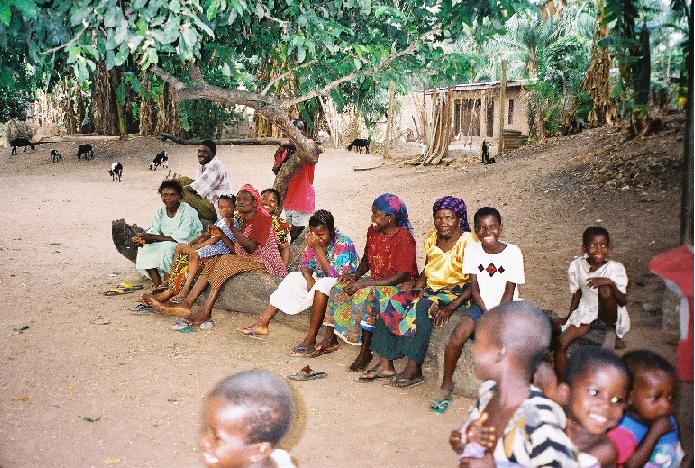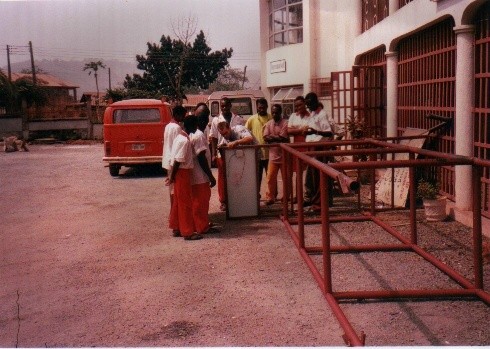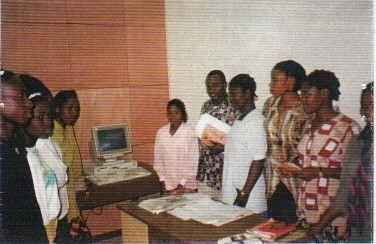|
Under the title "Present Projects" we are listing the projects that are been run by the Development Projects Coordination, Enugu, Nigeria as well as the projects underway.Here is a list if the projects
The Solar energy utilisation project is one of our present major project:
Photovoltaic(PV) installations in village rice & palm oil mills.
PV for the Computer Departments of 2 Vocational Centres
for Handicapped and Youths. Establishment of a workshop for the construction of small solar lamps in the Handicapped Centres (in Nigeria).

Photovoltaic (PV) installations in 4 village rice & palm oil mills which serve also as village information centres (Birth control, AIDS/HIV prevention etc). PV for the Computer Departments of 2 Vocational Centres for Handicapped and Youths. Establishment of a workshop for the construction of small solar lamps in the Vocational Centres because of non-existence of electricity in the villages and the constant interuption of electricity/ high cost of fuel in the towns.
Location:
Agbani, Ugbawka, Nomeh and Narah where this PV will be installed are typical African villages in Enugu State in the South-eastern part of Nigeria. The Vocational Centre for Handicapped and Youths where the workshop for the construction of solar-lamps will be established is located in
Background and Development Context:
With the financial assistants from the Federal governments of Austria, Germany and the regional governments in Italy and Austria, our association has succeeded in setting up 4 rice and palm products milling centres for the village women in Ugbawka, Narah, and Nomeh. These governments also contributed in financing the 2 Vocational Centres in Enugu and Agbani which were erected for the Handicapped and jobless youths in the area. Because of the poor situation in the villages, all the youths are escaping into the town. Most ot those left in the villages are desparate youths who are unable to escape into the towns, the old people, the handicapped, the sick, the young poorly educated women and their children who are abandoned by their husbands in seach of jobs in the towns.

The rice mills as well as the palm oil mill which we set up in Ugbawka, Narah and Nomeh are the major source of income for these women abandoned by their husband in the villages. The mills have become major motivating sources of income for the farmers, especially women in that area. With the extra profits the women make, they can then foot the medical bills of their children and pay their school fees. The husbands of some of these women stay too long away from their wives. This results in sexual contacts with prostitutes through whom AIDS find their way to the innocent wives in the villages.
The major streets in the towns are infested by such handicapped and jobless youths who escaped from their home villages. The handicapped resort to street-begging and the jobless youths to crime, drugg-traficing and prostitution. The Vocational Centre for Handicapped and jobless youths which we helped to establish in Enugu and Agbani is a great success. Today 462 youths and persons with disability are learning there. The computer section of the Vocational Centre is one of the most cherished department. Because of the incessant and daily interruption of electricity, the scholars/apprentices have to spend hours idle. The worst agony is the damage or the lost of entries made into the computers when the electricity is suddenly interrupted.

Objectives (project goals and project purpose
Very often, before major feast days, these women have to pass nights at the mills waiting for their turn. The villages have no electricity. With a solar energy Photovoltaic installation, light will be provide in the mill. The opportunity of the women waiting through the night will be used for informations - AIDS/HIV prevention, Birth control method, need for Polio immunisation (Polio is still the major cause of most disformities in the villages) etc with the aid of films or video materials using the electric current from the sun.
Photovoltaic installation in the Vocational Centres will make the computer departments and few lights to function irrespective of the constant power failures. The photovoltaic installation in the Vocational Centre in Agbani which has no electrical connections will make the computer studies there possible too. That means,, the youths and handicapped there will not be lured into the towns because of the non-existence of electricity in the Vocational Centre in Agbani.
The construction of small solar lamps developed by Ludwig-Bölkow Stiftung, Ottobrun, Germany have been successfully implemented in villages without electricity in India, Brasil, Tanzania among others. Nigeria, with a population of about 120 million persons, and where 80% of this population live in villages without electrical connection, is the best place to construct such lamps. Even in the towns with electrical connections, often houses and people are burnt because of lighted candles used as a result of the constant interruption of electricity.
The Vocational Centre for the Handicapped and Youths in Enugu is a very adequate location for construction of the solar lamp in Nigeria.
Expected Results:
The use of solar energy in that part of the world where there is constant sun almost 12 hours of the world is a logical imperative. The projects should help popularise the solar energy and the advantages. The photovoltaic installations in the mills not only provide light for the women who have to wait through the night to mill their rice, cassava or palm products, the electric current powers the information films or Video too.
Most villagers are offers of lack of information. Since many of the women are illiterate or have very little education, they often do not know what to do prevent himself or herself from AIDS or unwanted pregnancy. Many are sick and do not know why. The photovoltaic installation will enable these illiterate women get pictorial information from the Film and Video materials which are obtainable from the health and information ministries in Nigeria. The goal is the prevention of AIDS, over-population and deformities through polio.

With photovoltaic installations in the Vocational Centres, the computers and lighting can function independent of the constant interruption of electricity. The establishment of the workshop for the construction of small solar lamps create a new technology into Nigeria for the youths to learn. The lamp is the best answer to the constant electric interruption and a blessing for the people in the villages where there is no electricity.
Activities:
Our activities will not be limited to seeing to the constructions of the photovoltaic installations and the establishment of the small solar lamp workshop within 9 months. That is the construction of the module and their installation in the already existing buildings. The Solar technician from Europe will have to buy some of the equipment here in Europe. All others that are obtainable locally will be acquired in Nigeria. Our association will monitor the activities of the construction through visits and telephone/fax communications. All the conditions for a successful implementation of this project immediately it is finance are already existing - Site, personnel, solar technological know-how, etc. We shall also help monitor the use of the projects as we have done for the past 10 years.

Implementation (strategy and methodology)
Except for the solar technician from Europe who is to direct the photovoltaic installations and the establishment of the workshop for small solar lamps, the construction of the modules for the photovoltaic installation will be done locally in Nigeria. It is strategic very necessary that only such materials which are not available locally will be imported for the installations. The constructors must be the local artisans under the directive of the Solar technician from Europe. The period of construction is also a system of transferring solar-technology to the artisans. As much as possible the projects has to be given the widest possible publicity, especially during the period of construction to attract other local artisans and engineers to learn the method of construction. The photovoltaic modules will be placed at such strategic positions so that they can attract the attention of the people, in order to awake the interest for solar energy and technology.
Sustainability
All the projects we have so far help to establish are always accompanied by some mechanism by which they can sustain themselves, or be sustained by other existing projects. The photovoltaic installations are only additional complementation to already existing projects, which sustain themselves.
Although the Handicapped do not pay any tuition fees in the Vocational Centres, the other youths pay some fees. Since the Centres do not receive any financial subvention from the government, they only rely on the fees and the sales of their products and services to sustain the Centres. The existence of a photovoltaic installation and the workshop for the construction of small solar lamps will rather enhance the self-sustaining power of the centres.

The Palm oil and rice mills in the villages charge only 2/3 the normal milling price. In spite of that the profit made is enough to pay the workers, sustain the machines and up-keep the social information network. This new solar technology, which will be a major source of social and informative improvement for the people in the village, will also be sustained from the income in the mills. The Development Projects Coordination is a very reliable organisation, which sees to the sustenance of the projects.
Objectives
The importance of the use of solar energy in that part of the world where there is constant sunshine almost 12 hours of the world should be seen as a logical imperative. Unfortunately, there is little or no attempt in this direction yet. This project should help popularise the solar energy and the advantages.
Long term goals of the Solar energy utilisation project
- The photovoltaic installations in the mills not only provide light for the women who have to wait through the night to mill their rice, cassava or palm products, the electric current powers the information films or Video too.
Most villagers are offers of lack of information. Since many of the women are illiterate or have very little education, they often do not know what to do prevent themselves from AIDS or unwanted pregnancy. Many are sick and do not know why. The photovoltaic installation will enable these illiterate women get pictorial information from the Film and Video materials which are obtainable from the health and information ministries in Nigeria. The goal here is the prevention of AIDS, over-population and deformities through polio.
- With photovoltaic installations in the Vocational Centres, the computers and lighting can function independent of the constant interruption of electricity.
- The establishment of the workshop for the construction of small solar lamps create a new technology into Nigeria for the youths to learn. The new workshop for the solar lamps will also become another job opportunity for the handicapped and jobless youths in the Vocational Centre.
- The lamp is the best answer to the constant electric interruption and a blessing for the people in the villages where there are no electricity.
- Whenever the public electricity is interrupted most family resort to using candle light. This happens everyday in the various towns in Nigeria. Many families have lost lives and property because of such lighted candles which cause fire-blaze. The introduction of solar energy into the society will rather save lives in the long run.
- Through these installations and the accompanying campaign, the advantages of solar energy will be made glaring in the Nigerian society.
- The acceptance of solar electricity will pave the way for the introduction of solar cookers. Through the using of firewood for cooking, very vast area of land in many villages have been deforested. Erosion and consequently drought are the result of the indiscriminate cutting down tree for cooking. Unfortunately, the people in the villages have no alternative. Solar cooker is the best alternative. This can however only be introduced when the people have seen the advantage of light from the solar energy
We shall be very grateful for your assistance to the realisation of this project.

The next Project is the Village Rotating Loan Scheme:
Village Rotating Loan Scheme for women
(Rotierendes Darlehen für Dorffrauen)
The project is a means of encouraging enterprising village market women and farmer with small interest-free/symbolic interest loans. It is an indirect means of financing the school and medical fees of the village children. And it is an indirect way of helping to finance the infrastructures of the villages.
( Wege zur Ermutigung der Dorfbäuerinnen und Markthändlerinnen durch kleine Darlehen (zinsenlosen od. symbolische Zinsen). Indirekte Finanzierung der Schul- und Medikamentenkosten für ihre Kinder).
|
|






